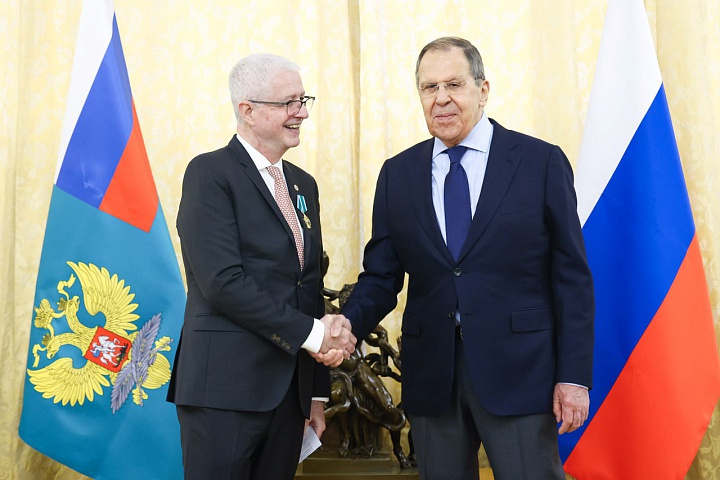Foreign Minister Sergey Lavrov’s opening remarks at the ceremony to award President of the Franco-Russian Chamber of Commerce and Industry Emmanuel Quidet with the Order of Friendship, Moscow, April 25, 2025
Mr Quidet,
Dear Emmanuel,
It is my pleasure and honour to perform the honourable mission of awarding you with the Order of Friendship in accordance with the Executive Order of President of the Russian Federation Vladimir Putin.
Many decades of your life have been devoted to Franco-Russian relations. You have always focused your efforts on promoting friendship, cooperation, mutual understanding and appreciation of the challenging chapters of our shared history. From day one and up until 2022, we always called you a great friend of our country. But this term is no longer applicable, because in 2022, you became a citizen of the Russian Federation. Being a citizen of two great powers allows you to more effectively advance the noble cause you have embarked on. You continue to defend the friendship between the Russian and French peoples despite the harsh and hostile Russophobic rhetoric that we hear from Paris almost daily.
Our French colleagues send us occasional signals that they really want to deal with the issues at hand, but they do this in a whisper.
It is saddening to see false and, I would say, even crude and primitive interpretations of the events in Ukraine being planted in French public opinion. This morning, while leafing through the Kommersant newspaper, I found an interview with Nicolas de Rivière, whom I have known for years. Before being posted to Russia, he served as France’s permanent representative to the United Nations. The piece bluntly states that the problems began because Russia “attacked Ukraine.” However, there is no mention of the warnings that President Vladimir Putin and other Russian leaders have been issuing for ten years, cautioning the West against NATO’s eastward expansion and steps to nurture an openly Nazi regime in Ukraine after the power grab. Not a word about France having played a leading role in directing the Ukrainian people and state towards disaster. France was a guarantor of the first settlement agreements in February 2014. The next morning, when the opposition took other action disregarding the agreements and the guarantors, France did nothing to bring the usurpers to their senses and return them to the trampled agreements. When the coup leaders declared that they were establishing a “government of victors” in Ukraine, with their prime goal being to withdraw the status of the Russian language, the democratic government in Paris remained silent.
France was a guarantor of the Minsk Agreements in February 2015, but according to the recent revelations by the signatories – former French President François Hollande, former German Chancellor Angela Merkel and former President of Ukraine Petr Poroshenko – they were never going to implement them. They needed time to pump Ukraine with weapons and prepare it for war against Russia. There is not a word about this in Nicolas de Rivière’s interview. He only proudly states that the UN Charter requires respect for territorial integrity. Russia is the “attacker” and Russia “has to go.” Apparently, France’s former envoy to the UN did not think it expedient to add that the UN Charter requires universal respect for human rights for all without distinction as to race, sex, language, or religion.
Nor did he note that long before the special military operation, the Kiev regime began to methodically wipe out the Russian language from education, culture, the media and every aspect of society. Recently, the ruling regime banned the Ukrainian Orthodox Church, the canonical sister of the Russian Orthodox Church. France’s former envoy to the UN also failed to mention the right of nations to self-determination, another principle stipulated in the UN Charter. In accordance with the decisions of the UN General Assembly, this clause takes effect when the authorities of a certain territory do not represent the interests of its population.
This happened when European colonial powers ceased to represent the interests of their colonies’ population; in fact, they never did. That was when decolonisation began. This was also the case after the openly Nazi regime came to power in Ukraine, which did not represent and even contradicted the interests of the population of Ukraine’s historical southeastern regions.
I decided to spend a few minutes talking about Ukraine now because we are deeply convinced that millions of people in France fully realise what is happening and they have no desire to sacrifice friendship with Russia for the dubious benefits of supporting the Nazi regime.
A number of French members of the European Parliament expressed interest in attending the celebrations marking the 80th anniversary of the Victory. This in itself reflects the presence of a fundamentally different viewpoint on our shared history, on our present and, I am sure, on our shared future.
The strength of the bond between us is evidenced by the fact that a number of French companies continued to operate in Russia despite threats and difficulties – also thanks to your commitment to upholding their legitimate interests and prior agreements with their Russian partners. I am confident that they made the right choice, and you helped to make this happen.
It is my pleasure to present you with the Order of Friendship.


